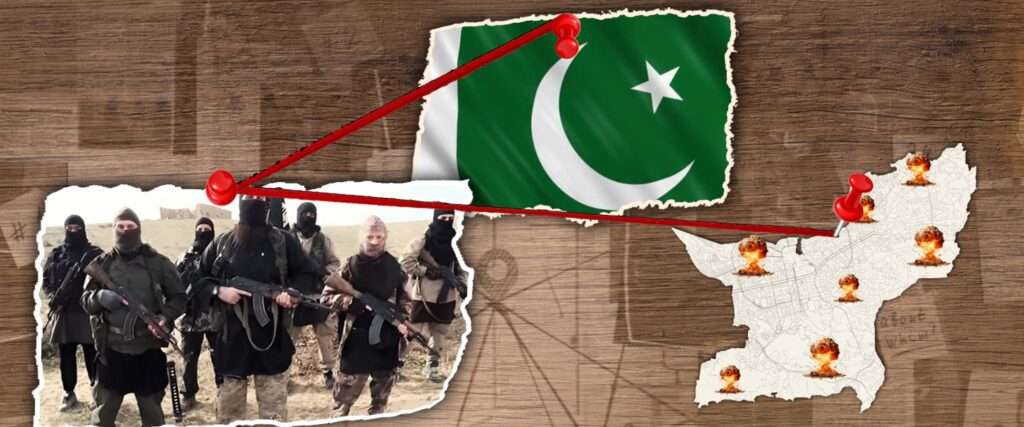Pakistan’s association with various militant groups has consistently attracted international attention. Recently, the country’s purported control and influence over terrorist organizations such as ISIS-K, Lashkar-e-Tayyiba (LeT), and Hizbul Mujahideen have surfaced as significant components of its wider regional strategy. These actions are perceived not only as attempts to regulate the Islamic Emirate of Afghanistan (the Taliban government) and the Tehrik-i-Taliban Pakistan (TTP) but also as a method to reinforce Pakistan’s relevance in the changing security dynamics of Central and South Asia.
Pakistan’s Use of Militant Groups as Strategic Tools
Containing the Taliban and the TTP
Pakistan’s ties to groups like ISIS-K, Lashkar-e-Tayyiba, and Hizbul Mujahideen are seen as a way to counter the Afghan Taliban and TTP’s influence. After the Taliban’s return to power, Pakistan’s northern boundaries are marked by increased cross-border conflicts and a resurgence of TTP attacks in Pakistan. By maintaining relationships with the militant groups, Pakistan seeks to exert pressure on the Taliban and TTP, using them as leverage when necessary.
The “Kashmir Style Infiltration” Tactic
Former TTP commander Ehsanullah Ehsan revealed that Pakistan employs a ‘Kashmir-style infiltration’ along the Durand Line. This strategy involves creating distractions through armed clashes with Afghan forces, allowing for the covert movement of allied militants into specific Afghan areas under the guise of military operations. This approach mirrors Pakistan’s historical tactics in Kashmir, where similar infiltration and diversion methods have been used to achieve strategic objectives.
Regional Ambitions and the Central Asian Dimension
Post-Crocus Hall Attack Calculations
The March 2024 Crocus Hall attack in Russia, linked to ISIS-K, highlighted the group’s rising influence in Central Asia. In response, Pakistan aims to position itself as a key player in combating these transnational threats, like its role during the Global War on Terror, when it was seen as a frontline state against terrorism in Afghanistan, gaining international support. By influencing groups like ISIS-K, Pakistan seeks to enhance its reputation as a vital security partner in the region.
Allegations of State Sponsorship
Afghan Taliban and Iranian officials have accused Pakistan of supporting ISIS-K for territorial gains and destabilisation. These claims intensified after ISIS-K announced operations against Baloch freedom fighters, which Afghan authorities interpret as evidence of Pakistani involvement. The perception of ISIS-K as a ‘Pakistani phenomenon’ is reinforced by its focus on fighting Baloch insurgents, aligning with Islamabad’s goals to suppress separatist movements in Balochistan.
Internal Security Challenges and Blowback
Rising Instability in Khyber Pakhtunkhwa and Balochistan
In spite of its attempts to influence militant organisations for strategic purposes, Pakistan is currently confronted with serious internal security issues. There has been a notable increase in assaults on the Pakistani army and security personnel in Khyber Pakhtunkhwa and Balochistan, leading to considerable casualties and a decrease in morale within the military. The recent propaganda videos announcing the deployment of ISIS-K against Baloch freedom fighters highlight the lengths to which Pakistan’s intelligence services are prepared to go in utilising extremist proxies to suppress internal opposition.
The Cost of Proxy Warfare
Pakistan’s enduring support for militant organisations has resulted in a double-edged sword. Although these groups have acted as instruments for regional dominance, they have simultaneously led to increased instability within the country. The Pakistani military’s failure to avert daily casualties in turbulent provinces underscores the dangers associated with this strategy. This predicament is further intensified by the military’s declining morale, especially in the aftermath of Operation Sindoor, carried out by India in retaliation for the Pahalgam terrorist attacks on its innocent civilians.
Conclusion
By leveraging local terrorist organisations such as ISIS-K and Lashkar, Pakistan seeks to exert influence over the Taliban administration, combat the TTP, affirm its significance in the battle against transnational terrorism, and quell separatist movements domestically. Nevertheless, this strategy has also contributed to instability within Pakistan’s own territory, prompting concerns regarding the long-term viability and repercussions of employing proxy warfare as a means of state policy.

